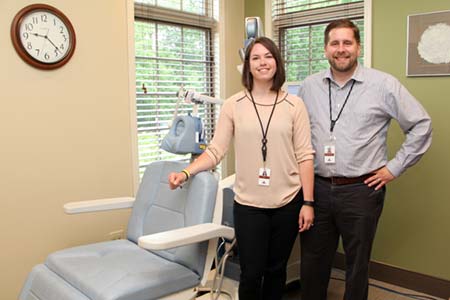
Rogers Foundation helps patients with treatment-resistant depression gain their lives back through TMS
03/07/17 04:18:am
However, thanks to a generous donation by Dr. Michael and Billie Kubly, Rogers Memorial Hospital Foundation was able to provide the hospital with the necessary funding to purchase a Neurostar Transcranial Magnetic Stimulation (TMS) device. Since its arrival in late 2014, it has been used effectively with more than 75 patients in the FOCUS program.
According to TMS technician Katie Alter, approximately 75% of the patients she has treated have reported a reduction in their depressive symptoms, with about 30% of them experiencing full remission.
TMS is a noninvasive and painless treatment in which a series of quick magnetic pulses are delivered to a precise location in the prefrontal lobe on the left side of the brain, which is believed to regulate mood. During an initial consultation, Tyler Rickers, MD, the physician who oversees the program, meets with the patient to determine whether TMS is appropriate for them. He then begins the careful work of calibrating the treatment to set the motor threshold, which indicates the dosage needed to stimulate the brain. It’s slightly different for everyone. After the initial session, Alter continues the prescribed therapy set by Dr. Rickers, seeing the patient five days a week for six weeks.
Side effects are minimal. “Patients may experience headaches during the first week,” said Alter, “but that is usually temporary. Memory is not affected, and a patient can drive right after the appointment.”
“Most patients describe the effects of TMS as gradual,” Alter further explained. “They say it feels like they are slowly coming out of a fog. As the days go on and treatment continues, they just feel better and better.”
The obvious changes Alter observes in her patients’ moods is impressive, she admits, but it’s the joy her patients express as they begin to feel better that’s more powerful to her. “A number of family members and friends have said they are seeing, for the first time in a long time, the person they knew before the illness. That is so rewarding.”





